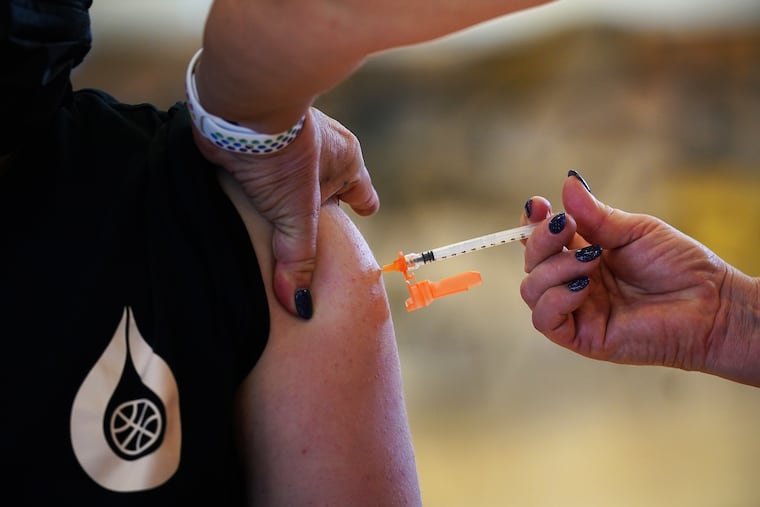What are the symptoms of omicron? Here’s how they differ in vaccinated and unvaccinated patients.
Judith O’Donnell, the chief of infectious disease at Penn Presbyterian Medical Center, spoke to The Inquirer about the latest COVID-19 surge and the symptoms of the omicron variant.

The highly contagious omicron variant now accounts for most new COVID-19 cases in the United States. And with a surge in cases and intense demand for scarce at-home rapid tests — which don’t differentiate among variants — Americans experiencing COVID-like symptoms are scrambling to figure out whether they’ve contracted omicron, a previous variant, or just a seasonal cold.
Judith O’Donnell, the chief of infectious disease at Penn Presbyterian Medical Center, spoke to The Inquirer about the latest surge and how omicron symptoms differ for vaccinated and unvaccinated patients. This interview has been edited for length and clarity.
What are the symptoms of omicron?
We’re still seeing the usual list of symptoms that we would expect with COVID-19: fever, fatigue, cough, shortness of breath, and then loss of smell and taste. Sometimes congestion, runny nose, sometimes nausea and vomiting and sometimes diarrhea.
I think what we are experiencing, though, is for people who are vaccinated, or vaccinated and boosted, we’re not seeing as much fever, if any, as opposed to an unvaccinated person.
» READ MORE: Booster demand has been up in the Philly suburbs, but many still haven’t gotten their extra dose
There’s been some reporting in the scientific literature that when patients are vaccinated, or vaccinated and boosted, the symptoms in general are much milder. They’re more consistent with a typical cold. There’s a lot of talk in the media about getting a lot more runny noses, or congestions. That does seem to be shown in some of the early scientific studies.
Why does omicron seem to cause more mild illness?
There’s the question of — are these [milder cold symptoms] related to the variant? Or are they related to the fact that many individuals who are experiencing an infection with omicron are either vaccinated, vaccinated and boosted, or in some parts of the world, like South Africa [where the variant was first identified], they’ve already had natural immunity from a prior infection?
It may not be the variant — it may just be us, as humans, because we now have immunity to COVID-19 as a virus, and as a result, our bodies have some prior experience with it. So we’re experiencing the infection more like a common cold.
What are the symptoms of omicron in an unvaccinated person?
In the unvaccinated, omicron looks very similar to delta and all the prior variants and the original strain. It can land you in the hospital if you’re unvaccinated and can lead to ICU care or death. It should not be taken as “it’s just a cold” for everyone, because that’s not the case at all.
» READ MORE: Should COVID-19 vaccine mandates include a booster shot? | Pro/Con
In an unvaccinated person, omicron is quite capable of and is actually causing pneumonia. People are coming in [the emergency department] with shortness of breath due to pneumonia, just like it has with prior waves and prior variants.
How prevalent is omicron in the Philadelphia region?
On our PCR testing platform [at Penn Presbyterian], there’s a particular testing pattern that is suggestive of omicron — the sample would have to be [DNA sequenced] to know that with 100% certainty, but based on that platform, we can say whether a sample is probably omicron.
We have been seeing a lot of omicron in the region. It’s really the predominant strain we’re seeing here in Southeastern Pennsylvania.
How has the latest COVID-19 surge affected your hospital?
We’re breaking records every day in the emergency rooms with the volume of visits with people coming in sick, and our hospital inpatient census of COVID cases has risen every day, steadily, over the last week. We have not peaked yet, as far as we can tell.
The patients admitted who require inpatient care are overwhelmingly unvaccinated. There is a small proportion of vaccinated people who are admitted, but by and large, three-quarters at least, if not more, are unvaccinated.
» READ MORE: What you need to know about Philly’s vaccine mandate for indoor dining
What should vaccinated people experiencing COVID symptoms know?
Vaccinated people who have cold symptoms, nasal congestion, runny noses, sore throats, but aren’t experiencing fever — if you’re vaccinated and boosted, and those are the symptoms you’re having, you may have COVID-19. It’s so prevalent across our region that it’s spreading efficiently and widely.
I’d encourage them to try to test themselves. At this point, given you’re vaccinated and boosted, this is going to be a mild illness. They should consider this great news, because they did get vaccinated and boosted, and it’s allowed them to have a COVID-19 infection that is mild. And they’ll recover in a week or so, just like with other common cold symptoms.
I encourage everyone to get vaccinated and boosted, if they haven’t yet.